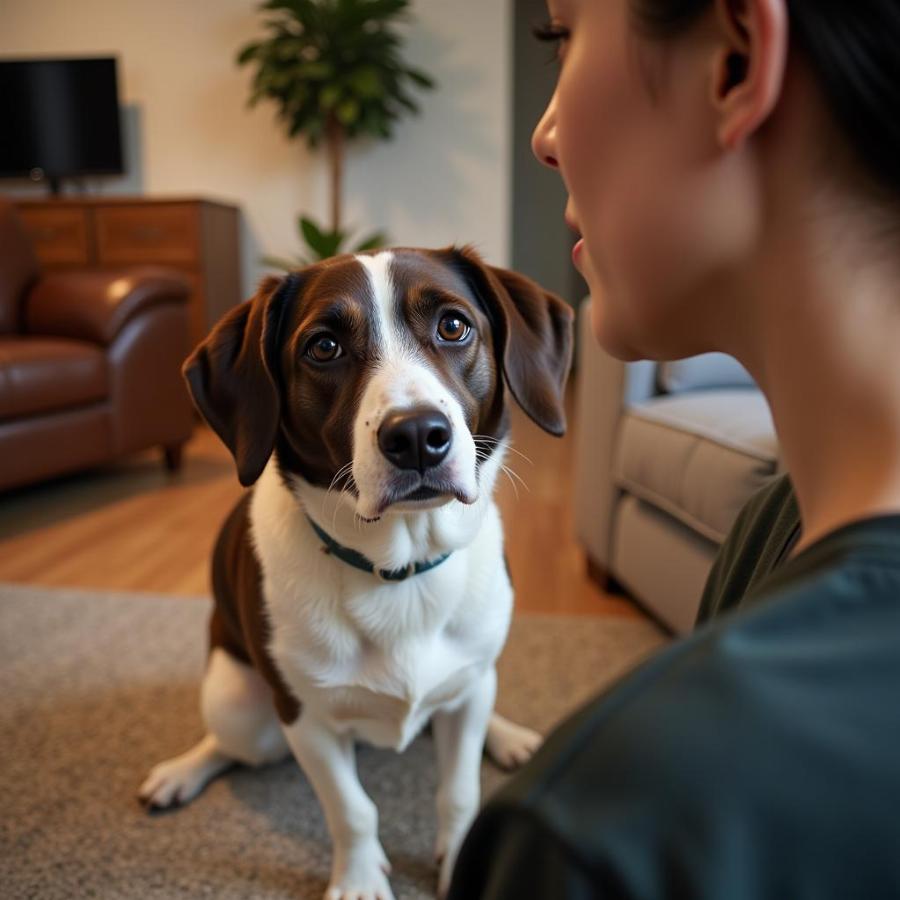Do dogs respond to baby talk? It’s a question many dog owners ponder as they coo and chat with their furry companions. This article delves into the fascinating world of canine communication and explores the science behind how dogs perceive and react to the high-pitched, sing-songy tones we often use with babies and, yes, our beloved pets. We’ll uncover the secrets of doggy linguistics and reveal whether your “sweet little pup-pup” truly understands your affectionate babble.
How Dogs Perceive Human Speech
Dogs may not understand the specific words we use, but they are remarkably attuned to the emotional nuances in our voices. Studies have shown that dogs respond positively to higher-pitched voices, similar to the baby talk we use with infants. This doesn’t necessarily mean they comprehend the words themselves, but rather, they associate the tone with positive emotions like affection and excitement. Their sensitivity to vocal cues allows them to pick up on our feelings and intentions, forging a strong bond between human and canine.
 Dogs Responding to Human Voices
Dogs Responding to Human Voices
The Science Behind Baby Talk and Dogs
Research suggests that dogs, particularly puppies, respond more readily to baby talk than to regular adult speech. A 2017 study published in Proceedings of the Royal Society B found that dogs paid more attention to speakers who used dog-directed speech, characterized by exaggerated intonation and higher pitch. This specialized way of speaking, often referred to as “dog-directed speech” or “puppy talk,” seems to capture their attention and facilitate communication. Similar to how babies learn language, puppies may find these simplified vocalizations easier to process and associate with meaning.
Do All Dogs React the Same Way?
While many dogs respond positively to baby talk, individual reactions can vary based on factors like breed, age, and personality. Some dogs may become overly excited, while others might seem indifferent. It’s important to observe your dog’s body language and adjust your communication style accordingly. Tail wags, relaxed posture, and focused eye contact are generally positive signs, while signs of stress or anxiety, such as yawning, lip licking, or turning away, suggest that your dog may not be enjoying the interaction.
Talking to Your Dog: Tips and Tricks
- Observe your dog: Pay attention to their body language to gauge their response to your tone of voice.
- Use a positive and upbeat tone: Even if you’re not using baby talk, a happy and encouraging voice can strengthen your bond with your dog.
- Combine vocal cues with hand gestures: This can help your dog understand your intentions more clearly.
- Be consistent: Use the same words and phrases consistently for commands and cues to avoid confusion.
- Don’t overdo it: While some baby talk can be endearing, excessive babbling can become overwhelming for your dog.
Is Baby Talk Beneficial for Dogs?
While the jury is still out on the long-term benefits of baby talk for dogs, it can undoubtedly strengthen the human-animal bond. The positive emotions associated with this type of communication can foster a sense of connection and trust between you and your furry friend. Perhaps dogs simply enjoy the special attention and affection that often accompany these high-pitched tones.
Conclusion
So, do dogs respond to baby talk? The evidence suggests they do, but not in the same way humans understand language. They pick up on the emotional cues in our voices, associating higher pitch and exaggerated intonation with positive feelings. While not all dogs react the same way, observing your dog’s body language and tailoring your communication style can further enhance your special bond. Remember, clear, consistent, and positive communication is key to building a strong and loving relationship with your canine companion.
FAQ
- Do dogs understand what we’re saying when we use baby talk? Not the specific words, but they understand the emotions conveyed through tone and pitch.
- Is it bad to use baby talk with my dog? Not necessarily, as long as your dog responds positively and it doesn’t hinder training.
- Do all dogs like baby talk? No, individual preferences vary. Observe your dog’s body language to determine their preference.
- What other ways can I communicate effectively with my dog? Use clear and consistent commands, positive reinforcement, and hand gestures.
- Can baby talk help train my dog? While baby talk might get your dog’s attention, it’s essential to use clear and consistent commands for effective training.
Further Reading
If you found this article helpful, you might also be interested in reading sounds that make dogs howl and sounds that will make dogs howl. These articles delve into the fascinating world of canine vocalizations and explore the different types of sounds that trigger howling in dogs. You might also be interested in learning about dog liking woman to understand more about dog’s behaviors.
Beaut Dogs: Your Ultimate Resource for Canine Care
Beaut Dogs is your one-stop shop for all things canine, offering expert advice and resources on dog breeds, care, training, and much more. From puppyhood to senior years, we’re here to help you provide the best possible care for your furry friend. When you need expert guidance, contact us at [email protected] (Email address) for detailed and accurate answers from Beaut Dogs. We are dedicated to helping you navigate the wonderful world of dog ownership and build a lasting bond with your beloved companion. Visit us at https://beautdogs.com.